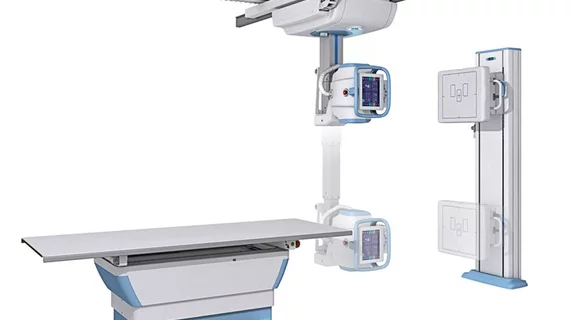Industry names in the news: Bayer, iCAD, Konica Minolta, Sectra, Siemens
> Konica Minolta Healthcare extends dynamic digital radiography technology to its KDR Flex Overhead X-ray system, which the company says automatically tracks and aligns the tube to the table or wall stand and can be configured as a manual, semi-automated or fully automated system. Guillermo Sander, PhD, digital radiography marketing director: “Our commitment is to do more with primary imaging. The ultimate goal is to enhance patient care by enabling better decisions, sooner” (Nov. 3).
> Bayer installs its first Medrad Centargo CT injection system in North America at Sunnybrook Health Sciences Centre in Mississauga, Ontario. Henry Sinn, director of medical Imaging at Sunnybrook: “[T]he significant gain in efficiency enables better patient experience and translates into higher patient-throughput, exactly what we need to ramp up our capacity in recovering from the pandemic-induced backlog. With the new CT scanners and the new injection systems, we are planning to increase our outpatient appointments per hour by 50% by year’s end” (Nov. 7).
> Siemens Healthineers announces restructuring of diagnostics division to save approximately 300 million euros ($302 million) each year as of 2025. Siemens CEO Bernd Montag says the move will reduce “focus on certain locations” while sources inside the company say the plan involves “cutting jobs and abandoning certain locations” (Reuters, Nov. 9).
> Sectra to supply enterprise imaging for radiology, breast imaging and orthopedics at Boston Medical Center. Senior director of EHR at BMC Eric Podradchik: “Sectra PACS and VNA will provide the backbone of an enterprise imaging strategy at Boston Medical Center. This goal will improve our providers’ ability to care for our underserved patient population by providing a consistent reading platform and access to all images across different physician specialties throughout BMC.” … Sectra president Isaac Zaworski: “Sectra will enhance BMC’s physician workflow by providing its radiologists with a multi-modality enterprise overview and its orthopedic surgeons the ability to do 2D and 3D pre-operative planning” (Nov. 9).
> Cancer care medtech company iCAD allies with Radiology Partners on multiyear commercial agreement around screening mammography AI. Stacey Stevens, iCAD president and CEO: “Radiology Partners provides mammography services to millions of women per year across more than 3,000 facilities. This partnership will represent an exciting opportunity to aggressively expand access to our technology to more women.” … Nina Kottler, MD, Radiology Partners associate CMO for clinical AI: RP and iCAD “share a commitment to advance the use of AI to become standard of care in mammography screening” (Nov. 10).

